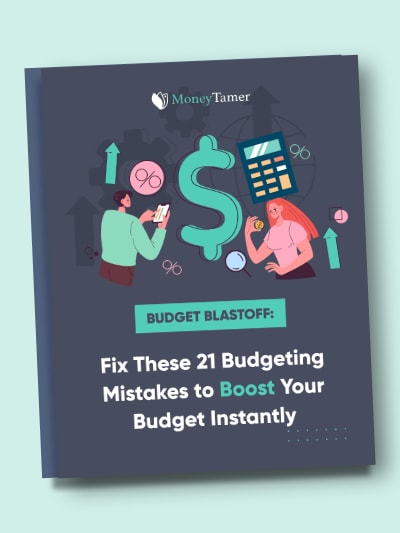10 Ways to Improve Your Financial Confidence

Do you feel lost when thinking about money? If so, you’re not alone.
So many people find financial ideas challenging.
As an affiliate partner of various brands and sponsored content, HerPaperRoute may earn commission on qualifying purchases. Disclaimer
There are many concepts to remember, but the basics aren’t as tricky as they seem.
With some practice, you can improve your financial confidence, so you feel ready to tackle your budgeting, investing, and savings goals.
What Does It Mean To Have Financial Confidence?
Financial confidence is simply realizing that you have what it takes to handle your money and building up the habits that help you do so.
To begin, you don’t have to know much about money. Simply understanding that you can get to where you want to be is enough.
And being willing to take an honest look at your money can give you a clear picture of what is going well and what needs work.
You can increase your financial confidence over time, too.
As you learn more about your specific money situation, you can improve your own circumstances and feel more comfortable making financial choices.
Let’s look at ten ways to improve your money goals and how you can know that you’re capable of achieving them.
1. Have Courage
No matter where your finances are at, whether you have a large amount of debt or don’t feel like you have the knowledge you need, you can be brave.
Face your financial fears and have the courage to try something new to improve your situation.
Most importantly, be willing to branch out. Even if you haven’t successfully handled money in the past, you don’t have to know everything about it – just start somewhere.
You can improve your skills as you go along. Here’s how to be courageous with your finances:
- Believe you are good with money. This is an essential step. You must believe that you have what you need to do well and have the skills to become better. Start telling yourself that you’re good with money.
- Know that it’s okay not to have the answers. Being confident doesn’t always mean you know everything. It just means you are certain that you can figure it out. So having all the answers isn’t necessary to get started.
- Focus on what you need to know that pertains to your situation. There is so much information out there about investments, savings accounts, and more. You may find yourself wanting to learn everything at once. Instead, focus on the basics. In other words, if you’re a beginner budgeter, learn about that before moving on to researching the best stock options.
2. Educate Yourself about Finances
The best way to find out what to do with your money is to educate yourself. A good way to begin is to find a few finance experts that you can relate to and start to listen to their podcasts or read their books or blogs.
Related: List of the Best Books on Budgeting to Transform Your Finances
As you learn, if there’s a term you don’t understand, look it up. Commit it to memory. When a topic interests you, research more resources that discuss it.
Also, talk with others about what you’re learning. You don’t have to share specific numbers about your budget or plans, but talking to friends or family about general money topics will help. You’ll retain what you pick up from research.
Suppose you don’t feel comfortable doing this. You could also write down what you’re learning in a notebook or journal as a way to hold onto the information.
Finally, make money education (aka personal financial literacy) a daily part of your life. For example, listen to a podcast on the way to work or look up new blog posts that discuss current finance questions each morning.
Find a way to build this form of education into your routine, so you’re continually learning and improving your financial confidence.
3. Invest
If you aren’t investing, today is a great time to start. There are tons of investment opportunities, so please don’t feel that you have to try all of them.
Instead, spend some time looking at your options to decide what to do.
There are many types of investment vehicles. IRA’s and Roth IRA’s help you save for retirement.
The difference is that a regular IRA is taxed when you take the money out years from now. The Roth taxes the cash as you place it in the account.
Other investing opportunities like mutual funds and ETFs are usually made of stocks, bonds, and other investments.
You can also invest in a retirement account and some other assets, as you can only add a certain amount to an IRA each year.
Each person is unique, and there are various levels of risk for investments. You can choose whatever you’re comfortable with.
It’s important to always research thoroughly before investing any money. I always recommend meeting with a certified financial advisor before making any moves with your money
4. Acquire Skills For Advancement In Your Job
A great way to gain financial confidence is to make more money. And a good plan to achieve this is to move up in your company or advance to a different job elsewhere.
The combination of having more cash and knowing what to do with it will keep you inspired. If you like the work you do but would enjoy more responsibility and a higher paycheck, take time to think about how to get ready for a promotion.
You can begin by learning the requirements for the role you want. Then, if you need to, take classes or get certified for the job.
When you feel you’ve mastered the skills, see if you can talk with someone in the company about a promotion or moving into a new role. It’s important that you also do excellent work in your current job to be considered for other opportunities.
If you would like to change careers, start by deciding what work you want to do. After that, gain the knowledge you need.
This may require night classes, reading books, or obtaining a degree. Then, begin looking for job opportunities that fit the career you want. Finally, continue to network and go to interviews until you find the right one.
Don’t be afraid to negotiate a bit for the amount of money you’d like to make. If your skills have improved, then it makes sense you should earn more. Have some expectations for your new salary.
Once you are in the job you want, it’s essential to continue learning and advancing. The more experience you have, the more likely you’ll get a raise or promotion in the future.
5. Create A Budget
Budgets are what make finances work. Think of it this way: if your financial life is a house, then your budget is the frame that holds everything together.
So you must make your budget a routine and stick with it.
Budgeting can be a bit of a trial and error process. It might take a few months or so to find the system you like best.
But once you do, remember that seeing results takes time, so you must use your budget for a while in order to get the benefits. Here are the first steps for creating a budget.
Effective budgeting will help you to control your money. That way, you save, spend, and invest the amounts that you want to.
When you master this, you’ll feel your financial confidence improve and be able to work your money plan easily.
Approaches to Budgeting:
- Automatic – an automatic budget means you set things up for your money, and then you are freed up from thinking about it too much. Set up your bills and payments to deduct automatically. That way, you aren’t constantly looking at your budget and having to rework it.
- The 50/30/20 budget – This is a simplified budgeting system I go more in-depth about here. The basics are you use 50% of your paycheck for the things you need to pay for, like bills.
The following 30% you spend on things you want that are unnecessary but nice to have. Finally, the last 20% is savings or whatever will help you most financially. This system won’t work for everyone, but you could also modify the percentages until they work for your life.
- The Save Half Method – for those who bring in a large income or have minimal expenses, try saving half your income. You can use the saved money for investing or emergency funding. This isn’t so much a budget idea as a lifestyle choice to live on less, but it can pay off big time.

Are You Sabotaging Your Budget?
See the budgeting mistakes that are holding you back in this FREE Budgeting ebook. Fix these and your budget will blast off!
6. Build An Emergency Fund
The Bureau of Economic Analysis found that the amounts saved by Americans are actually pretty high right now- over 27% in March! It’s time to follow this lead and begin building up some savings.
If a budget is the frame of a house, the emergency fund is the roof. It protects you, keeps out the elements, and ensures that you have shelter. Your emergency fund amount can vary depending on income and your monthly expenses.
Most say an emergency fund somewhere between 3-6 months of expenses is ideal. If this sounds like a lot, start small.
Try to save a few thousand. From there, build up to three months and then if you feel like you need more, continue saving slowly.
Related: Emergency fund vs Savings Account – Which is better?
Once you get to a few months of expenses saved, it’s really about your comfort level. Some people may even feel best with a 12-month emergency fund, while that’s way too high for others.
7. Let Go Of Preconceived Ideas About Money
Some people think of money as good or bad. It is neither.
What matters is how we handle the money we have. Whatever you believe about money, try to set it aside in favor of gaining knowledge.
Challenge your ideas about money by seeing the other side. For example, if you grew up thinking money is hard to acquire, begin believing that it’s possible.
If you always thought you only gain money from an inheritance, start thinking about earning it instead. Let new ideas make their way into your mind and see what change it brings.
So, how do you find out what ideas you already have about money?
- Write it out – write down the word money, and then free-write anything that comes to mind. From this, you should gain some perspective on what you genuinely think about finances.
You’ll probably see the words skew towards either positive or negative. Know that you can change it no matter what you think, so there’s no need to worry about your preconceived ideas. It’s just a starting point.
- Decide what you want to believe about money – No matter what you currently think, determine how you want to think about money and begin reminding yourself of it often. Think about what you can do instead of what seems unchangeable.
8. Develop A Long-Term Plan
It’s good to have a monthly budget and know what you’re saving for this year. But what about further along than that? “Someday” eventually arrives. I’ll break this down into different steps.
The Five-Year Plan
This is the plan you’ll focus on most of the time because it’s short-term. Write down some dreams that you’d like to achieve in the next five years.
They can be things like purchasing a home, moving to a new city, or saving a certain amount of money. Then, break those goals down into a year-by-year approach.
For example, your big goal might be to save $50,000.00 in five years. You can simplify by saving $10,000.00 per year. And you can even break this down further into monthly goals.
This will make the amount of time that passes for these goals more manageable. I break this down even more in this post about setting and achieving financial goals.
The Ten-Year Goals
These are further out and can be even bigger than five-year goals, also known as intermediate financial goals. Think big.
Things like paying off your mortgage or investing $100,000.00 will work for a ten-year plan. Again, break these down into smaller, one-year goals to achieve them more easily.
Your Retirement
This is likely further away than the other two goals, but if not, you can use it in place of them. When you’re younger, this is considered a long-term financial goal.
Think about what you want to do when you retire and the money you’ll need to get there. Then consider what types of saving or investing you might start to get to the retirement you want.
Track your savings, retirement, and net worth goals all in one place with this free financial dashboard.
9. Pay Off Debt
Depending on your situation, paying off debt could be challenging or easy. But the amount doesn’t matter.
What matters is being determined and willing to go the extra mile to become debt-free.
Much like you would set a savings goal and add money to it until you reach it, you can have a debt-payoff goal.
First, find out what you owe, and then begin paying off extra as often as possible. Keeping track will help you stay focused, and the harder you work, the faster you reach your goals.
Here are some ideas for paying off debt:
- Pick up a second job or work extra hours. Working more will give you the cash you need to meet your financial goals, and it can make your debt payoff quicker. You can even make money using apps.
- Stop using credit cards. If you want to work your way out of debt, stop relying on credit cards. Begin budgeting and only buying what you can afford to avoid adding to your debt.
- Reduce your bills and use the extra for debt payoff. Look at the things you don’t need in your budget, and try to go to a basics-only model for the time being. Only buy what you need, and know that the extra dollars are getting you out of debt.
10. Monitor Your Credit
Monitoring your credit is an excellent habit to get into that will take some of the scariness away from credit scores. Improving it becomes easier when you have all the facts.
- Research how to improve your credit score – over time, you can make your credit score better. This will help you with a mortgage, renting, and more.
- Make payments on time – this is an obvious way to improve credit and keep yourself from more debt. Pay on time every time, and you’ll create a good record over the following months and years.
You Can Improve Your Financial Confidence
Using these tips, you can improve your financial confidence. No matter how much you feel you have to learn, know that you can do it!
Understanding what to do with money is a skill, and like most other skills, you can get better at it.
Remember to think about money in positive terms, knowing that you’ll be able to make the most of what you have with hard work and organization. Things like budgeting, investing, and watching your credit score will help you to keep your finances in good shape.
Your financial confidence can improve starting today. Begin to learn about your money and know that it can become easier to reach your dreams and feel prepared for anything as you make this a habit.

Follow along on Instagram!











